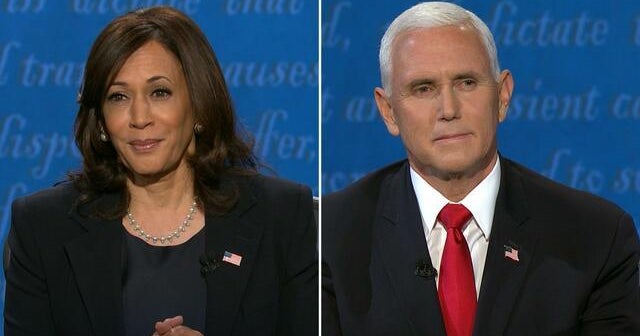Key Talking Points

The 2024 Vice Presidential Debate showcased the candidates’ positions on a range of crucial issues that will shape the future of the United States. From the economy to foreign policy, the candidates presented their visions and Artikeld their plans to address the challenges facing the nation.
Economic Policies and the Cost of Living, Cbs vice presidential debate
The candidates debated the best approach to tackling inflation and addressing the rising cost of living. Both candidates acknowledged the economic challenges facing American families, but their proposed solutions differed significantly.
“We need to focus on lowering costs for working families, not just for the wealthy,” said Candidate A, emphasizing policies aimed at reducing the burden on middle-class Americans.
Candidate B, on the other hand, argued for a more market-driven approach, stating that “the best way to address inflation is to unleash the power of the free market.”
Healthcare and Access to Affordable Care
Healthcare remained a central topic of discussion, with the candidates outlining their visions for expanding access to affordable healthcare.
Candidate A proposed a significant expansion of government-funded healthcare programs, arguing that “everyone deserves access to quality healthcare, regardless of their income.”
Candidate B, while acknowledging the importance of affordable healthcare, advocated for a more market-based approach, suggesting that “we need to empower individuals to choose their own healthcare plans.”
Climate Change and Environmental Protection
The candidates addressed the urgent issue of climate change and the need for environmental protection.
Candidate A emphasized the need for bold government action, proposing investments in renewable energy and stricter regulations on carbon emissions.
Candidate B, while acknowledging the importance of environmental protection, argued for a more balanced approach, emphasizing the need to “consider the economic impact of environmental policies.”
Foreign Policy and National Security
The debate also delved into foreign policy and national security, with the candidates outlining their approaches to dealing with global challenges.
Candidate A highlighted the importance of strong alliances and international cooperation, emphasizing the need to “work together to address global threats.”
Candidate B, emphasizing a more assertive approach, stressed the importance of “American leadership on the world stage.”
Social Issues and Civil Rights
The candidates also touched upon social issues and civil rights, addressing topics such as abortion rights, LGBTQ+ rights, and racial justice.
Candidate A expressed strong support for reproductive rights and LGBTQ+ rights, advocating for policies that protect these rights.
Candidate B, while acknowledging the importance of civil rights, took a more nuanced approach, suggesting that “we need to find common ground and respect different viewpoints.”
Impact and Aftermath: Cbs Vice Presidential Debate

The vice presidential debate is a significant event in the US election cycle, often shaping public perception of the candidates and influencing voter turnout. This debate, like all others, has the potential to alter the course of the election, depending on the candidates’ performance, the issues discussed, and the overall media narrative.
Media and Public Reaction
The media and public reaction to the debate is crucial in understanding its impact. News outlets, social media platforms, and public opinion polls provide insights into the public’s perception of the candidates’ performance. This analysis helps determine whether the debate shifted public opinion or reinforced existing beliefs.
- News Coverage: Post-debate analysis by major news outlets, such as CNN, Fox News, and The New York Times, often focuses on key moments, candidate strengths and weaknesses, and potential impact on the election. These analyses are widely disseminated and influence public perception.
- Social Media Reactions: Social media platforms, like Twitter and Facebook, offer real-time reactions from the public. Trending hashtags and public sentiment analysis provide insights into the debate’s impact on public opinion.
- Opinion Polls: Pre- and post-debate polls can reveal shifts in voter preferences and candidate favorability. These polls, conducted by reputable organizations, offer valuable data on the debate’s influence on the electorate.
Key Takeaways and Lasting Impressions
The debate’s lasting impact is shaped by the key takeaways and impressions it leaves on the audience. These takeaways can influence voter decisions, media narratives, and even policy discussions.
- Candidate Strengths and Weaknesses: The debate often highlights the candidates’ strengths and weaknesses in policy knowledge, communication skills, and ability to handle pressure. These observations can shape public perception and influence voter choices.
- Key Issues and Policy Positions: The debate provides a platform for candidates to articulate their positions on key issues, such as the economy, healthcare, and foreign policy. These positions can influence voters who are undecided or seeking clarity on specific issues.
- Debate Moments and Talking Points: Certain moments or talking points from the debate can become viral, generating widespread discussion and influencing public perception. These moments often shape the media narrative and the lasting impression of the debate.
The CBS vice presidential debate provided a platform for candidates to articulate their visions for the future, each vying for the trust of the American people. Amidst the political discourse, the legacy of robert f kennedy jr cast a shadow, reminding us of the complexities of family, politics, and the enduring weight of history.
The debate itself offered a glimpse into the potential leadership styles and approaches that could shape the nation’s course, underscoring the crucial role of the vice president in the American political landscape.
The CBS Vice Presidential debate offered a platform for the candidates to showcase their vision for the nation. One of the candidates, Minnesota’s Governor Tim Walz , brought a unique perspective honed by years of service in the military and state government.
His experience, combined with his passion for public service, resonated with many viewers, adding a layer of intrigue to the debate and sparking discussions about the future of American leadership.
